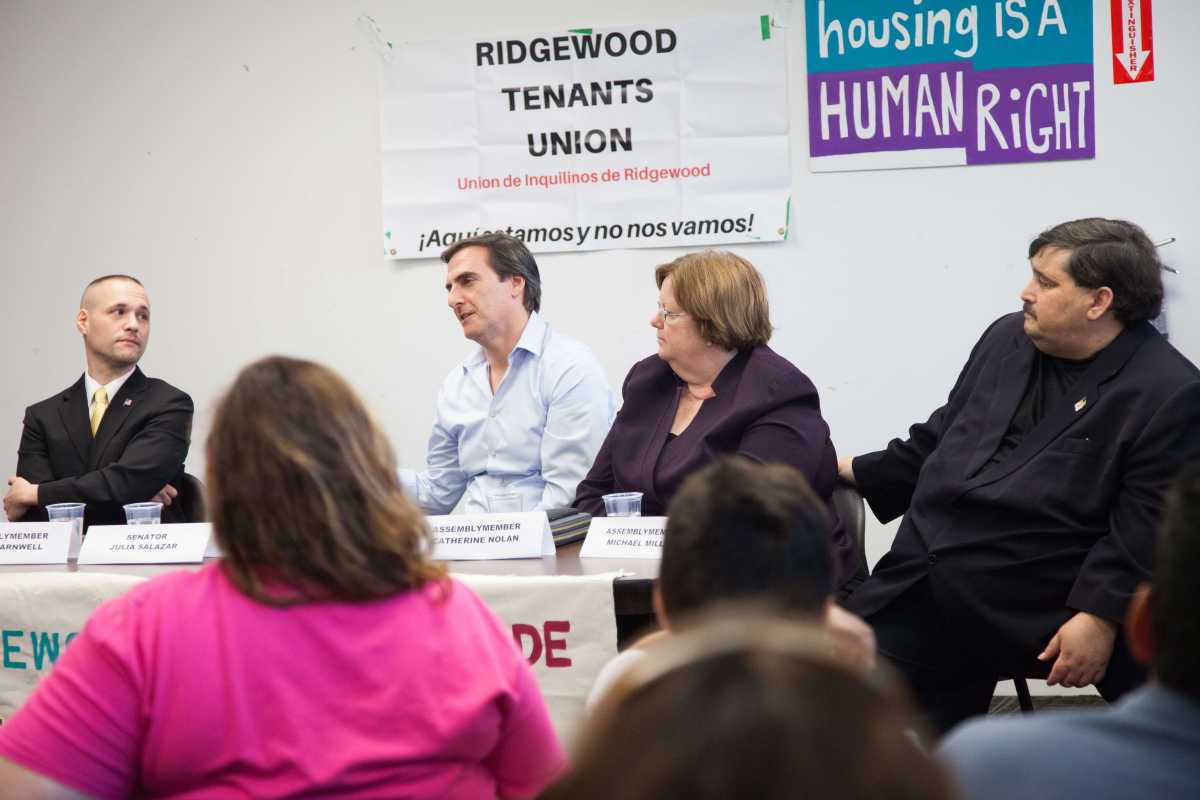The Ridgewood Tenants Union (RTU) held a town hall for residents on Saturday with local elected officials about the gentrifying neighborhood’s housing issues as the state Legislature prepares to consider a package of universal rent control bills expected to get a vote before the session ends in June.
The five legislators who came to the event – state Senators Julia Salazar and Mike Gianaris and Assembly members Catherine Nolan, Mike Miller and Brian Barnwell – all have publicly demonstrated their support the suite of rent control bills. At the May 18 meeting, they discussed future plans for additional tenants rights laws, and explained the resistance to the most controversial of the current bills: the good cause eviction law.
Though the mood between Ridgewood residents and politicians was congenial for the majority of the event, it dramatically shifted at the end when the organizers of the event confronted Nolan about her support for Amazon’s Long Island City campus. What started as a show of political unity then splintered into in-fighting in its last moments due to the lingering effects of the Amazon deal.
Ridgewood state Senator Joe Addabbo was absent from the town hall, although members of the tenants union confirmed that they had invited him during their visit to Albany on May 14 to rally for the rent control legislation.
“Many of members of RTU are suffering one way or another, either harassment, or MCI increases or other illegal ways of raising of the rents. The people that formed this union are fighting because they are fighting on their own for their stuff as well,” said RTU organizer Hilda Coll-Valentin.
The forum began with a series of speakers who related housing struggles related to the protections that are at stake in the legislation. A small landlord, a role that opponents of the bills argue would be hurt by their passage, said that he believes these laws will help landlords like him who would like to keep their tenants’ rents reasonable.
Another resident said that he had recently been given only 30 days’ notice that he was being evicted from his apartment of 31 years because his landlord passed it on to a family member who wanted to sell it immediately.
Gianaris responded that this issue fell under the purview of an additional law he has in the works that would stop landlords from being able to evict tenants in order to offer housing to their family.
A resident said that after a private equity firm that owns 29 other properties bought her building they informed her and her husband that they would be raising her rent from preferential rates to the legal rate. Though the woman applied for the Senior Citizen Rent Increase Exemption program, her rent was still frozen at the legal rate, which involved a 35 percent increase from her preferential rate.
“Preferential rents are designed to explode, creating exorbitantly high rent increases so that landlords can push out working class people whenever they want,” she said.
When the forum opened up to the questions from the audience, a member of RTU asked why the bill that Salazar sponsored prohibit the eviction without good cause is reported to be encountering the most resistance of all the bills in the legislature.
“It’s on me and it’s on us as a movement to make sure that all the assembly members and senators are informed about what the bill actually does,” Salazar said. “What makes it a heavier lift is that it’s a new bill, and people are unfamiliar with it.”
Since several of the other bills in the package had been proposed previously before the Democrats had control of both chambers, the legislators had more familiarity with them than they did to the good cause eviction bill.
Gianaris added that another reason for the friction on the good cause eviction bill is that it’s the only one of the nine bills that would provide protection to people who are not rent-regulated.
“So I think that’s also generating additional opposition from the real estate industry,” he said.
Discord began when members of the tenants union and Democratic Socialists of America pressed Nolan on her refusal to take a pledge that the organization’s Housing Justice for All coalition to sign a pledge to support rent control legislation and refuse donations from real estate.
Nolan asserted that she has always been in favor of rent control legislation, adding that the reason that she did not sign the pledge was that she has a practice of not signing pledges before legislation is proposed in order to make sure it’s not compromised.
“I’m not the candidate of the real estate industry, believe me. By and large, I’ve been elected on very small amounts of money,” Nolan added.
After that, Raquel Namuche, an RTU organizer, continued the pressure on Nolan by presenting her with a stack of anti-Amazon postcards that the organization collected after Nolan came out in support of the deal. Many of the letters connected constituents’ concerns about the HQ2 proposal to housing issues.
Nolan immediately stood up to rebut this challenge to her record.
“For any elected official, we have to put our judgement as to what we think is best based on conversations with everyone. For some of you, my support of that proposal is a deal breaker. So if you want to boo, that’s your right. But many other people didn’t feel that way,” she said.
After the event, Namuche told QNS that she had made the decision to confront Nolan about Amazon because she believes the housing issues at stake in the legislation to be connected to those raised by the Amazon deal, which fell apart in February.
“We need to trust that when it comes time to vote, our electeds will be on our side,” tweeted the RTU.


































